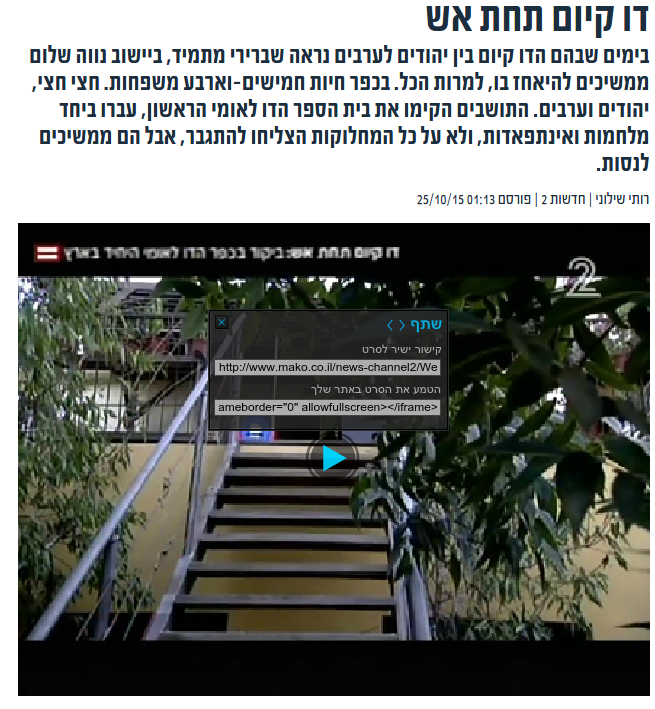Home > Oasis of Peace > "Coexistence Under Fire" - Media Reports on WASNS
"Coexistence Under Fire" - Media Reports on WASNS
Wednesday 28 October 2015

The escalation in the conflict has seen an increase of media interest in the village. Here are some links to interviews, TV and radio articles and more.
Channel 2
Israel’s Channel 2 produced a 10 minute segment on the village for the popular Saturday night news journal on October 24 (Hebrew):
Watch
Galatz Radio
[Israel Galatz Radio (Rafi Reshef), October 14, Hebrew.]
Interview with Samah Salaime and Nava Sonnenschein.
Listen (Interview begins at 2.40 mark)
Bokra (webzine article in Arabic, with many photos)
Read in Arabic
See below for English translation.
English translation of Bokra article
Residents of the "Oasis" enjoy peace and security despite the current circumstances
Atef Manna, Bokra.net - 10/18/2015 21:50
Wahat al-Salam – Neve Shalom is a small village set up in the 1970s, located on a hill midway between Jerusalem and Tel Aviv. It is populated by equal numbers of Palestinian Arabs with Israeli citizenship and Jews who believe in coexistence and a decent life with the other side.
A correspondent of Bokra visited Wahat al-Salam – Neve Shalom and spoke to a number of people there, on a day when most of the villagers were busy with the olive harvest and pruning of trees. The discussion with them touched on what is happening in the country, and the racist statements issuing from the Israeli government.
In this context, Bob Mark, a resident of the village of "oasis of peace", said the current circumstances in the country, especially the city of Jerusalem, “strengthen our faith in the possibility of coexistence with mutual respect for the other”.
Interviewed by the correspondent of Bokra, Mark stated: “the situation has not significantly affected the inhabitants of the oasis, although it is always in the background. Wahat al-Salam – Neve Shalom was founded in the 1970s on the basis of co-existence, and we maintain this principle at all times. This is not influenced by what is happening outside the village, though I did not expect that the country would face such difficult times.”
Bob continued, “Listening to Arab friends from outside the village, my heart goes out to them. They experiencee fear of violent attacks from the extreme right. I also hear Jewish friends from outside the village who describe their fear of Arabs. I’m sure these preconceived ideas do not exist here in Oasis. “
Mark concluded: “This situation of the country confirms the sincerity of our position of co-existence and respect for one other, and strengthens our belief in the continuity of the village and the need to bring others round to this position.”
Carmela Ferber, principal of the WAS-NS primary school, adds that students do not feel the situation of tension in the same way as adults. “Although, we cannot remain detached from what is happening in the country, we do not get into the details with the children. We do try to be sensitive to what our young pupils are feeling, on a daily basis.”
She continues: “Our students, even more than our teachers, are bound together by a strong friendship relationship as if they were one family, so the events and tensions in the country are far from their thoughts.”
A [Jewish] mother of a girl studying at the Oasis says: “My daughter has many Arab friends and girlfriends, and that my daughter studies here confirms absolutely that we believe in co-existence. I worked hard to make sure that our daughter Noga was able to study in a bilingual school.
Eyas Shbeta, one of the earliest people in WAS-NS, said: “We are affected by the state of tension all the time. The village has experienced several wars and confrontations between Israel the Arab states and Palestinian organizations over the years. I do not think that the current confrontation is the most difficult, and at the same time we can say in general that the state of tension in the country is not reflected in our daily lives – the village is like one big family.”
Samah Salaime - Aghbarieh, one of the inhabitants of WAS-NS says, “Every crisis and uprising or war with Gaza exposes our project of co-existence at risk. The village was founded forty years ago with the idea that the occupation will soon be over, and the establishment of a Palestinian state was just around the corner.”
She added that “the families in the Oasis are exposed to psychological crises as a result of events, especially in such difficult days. The people in the village are different from most segments of the Jewish society and the state. But, in general, daily life in the village is not affected by the situation. The proof is that today we can see the olive harvest activity in which all the people of the oasis and a number of volunteers from outside involved.” She concluded: "The village is like a drop of sweet water in a salty sea."
Ety Edlund said that “the atmosphere in the village is always influenced by that of the rest of the country. But we always hoped for a peaceful solution between the two peoples, Here in the village we were ahead of everyone. With the children we raised the Palestinian flag when it was still against the law. Then and now we still believe the solution is for the two peoples to live peacefully side by side. But unfortunately the situation seems more difficult than ever before, and there is an increase in extremism.”
She added: “I was hoping that the state of peace and harmony would be reflected in the country as a whole. We have chosen to live in this village with full faith faith in coexistence. If I could, I would influence the leaders in the country to find a solution in which the Israeli and Palestinian peoples would live in dignity and freedom.”


